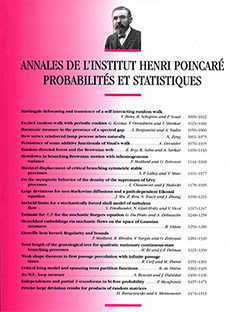Abstract
Fleming–Viot type particle systems represent a classical way to approximate the distribution of a Markov process with killing, given that it is still alive at a final deterministic time. In this context, each particle evolves independently according to the law of the underlying Markov process until its killing, and then branches instantaneously from the state of another randomly chosen particle. While the consistency of this algorithm in the large population limit has been recently studied in several articles, our purpose here is to prove Central Limit Theorems under very general assumptions. For this, the key suppositions are that the particle system does not explode in finite time, and that the jump and killing times have atomless distributions. In particular, this includes the case of elliptic diffusions with hard killing.
Les systèmes de particules de type Fleming–Viot représentent une façon classique d’approximer la distribution d’un processus de Markov avec mort, sachant qu’il est encore vivant à un temps final déterministe. Dans ce contexte, chaque particule évolue indépendamment suivant la loi du processus de Markov sous-jacent jusqu’à sa mort, et branche instantanément à partir de la position d’une autre particule, choisie aléatoirement. Alors que la consistance en grande population de cet algorithme a été récemment étudiée dans quelques articles, notre but ici est de prouver un Théorème Central Limite sous des hypothèses très générales. Pour cela, deux hypothèses clefs sont que le système de particules n’explose pas en temps fini, et que les instants de sauts et de morts ont des lois sans atomes. En particulier, cela inclut le cas des diffusions elliptiques avec obstacles durs.
Citation
Frédéric Cérou. Bernard Delyon. Arnaud Guyader. Mathias Rousset. "A central limit theorem for Fleming–Viot particle systems." Ann. Inst. H. Poincaré Probab. Statist. 56 (1) 637 - 666, February 2020. https://doi.org/10.1214/19-AIHP976
Information





